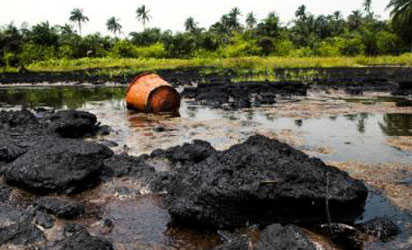Ahead of November 10, marking the 20th anniversary of the death of renowned environmental activist and writer, Ken Saro-Wiwa, London-based human rights watchdog Amnesty International (AI) and the Centre for Environment, Human Rights and Development (CEHRD) on Tuesday in a report, accused Shell Petroleum Development Company (SPDC) of failing in its legal obligations to clear up oil spills it caused in Nigeria’s oil-rich Niger Delta region.
The report titled, Clean it up: Shell’s false claims about oil spills in the Niger Delta, documents ongoing contamination at four oil spill sites that Shell said it had cleaned up years ago.
AI said the report was published to mark the 20th anniversary of the execution of the environmental activist and writer, Ken Saro-Wiwa.
Saro-Wiwa, who campaigned relentlessly against damage caused to the Ogoni area of Rivers State, was executed by the Sani Abacha junta on November 10, 1995.
“By inadequately cleaning up the pollution from its pipelines and wells, Shell is leaving thousands of women, men and children exposed to contaminated land, water and air, in some cases for years or even decades,” said Mark Dummett, Business and Human Rights researcher at Amnesty International.
“Oil spills have a devastating impact on the fields, forests and fisheries that the people of the Niger Delta depend on for their food and livelihood. Anyone who visits these spill sites can see and smell for themselves how the pollution has spread across the land,” he said.
The report also highlighted the failure of the Nigerian government to regulate the oil industry.
According to AI, the National Oil Spill Detection and Response Agency (NOSDRA), the government’s watchdog, was under-resourced and continued to certify areas visibly polluted with crude oil, as clean.
“As people in Nigeria and around the world remember Ken Saro-Wiwa and the eight other Ogoni leaders who were executed in 1995, Shell and the government of Nigeria cannot ignore the terrible legacy of the oil industry in the Niger Delta. For many people of the region, oil has brought nothing but misery,” said Stevyn Obodoekwe, CEHRD’s Director of Programmes.
AI said the findings of a 38-page report were based on research conducted in the Boobanabe, Bomu Manifold, Barabeedom swamp and Okuluebu areas of Niger Delta’s Ogoniland region, between July and September this year.
According to AI, spills in those areas dated back several years.
The report stated that AI researchers found waterlogged areas with an oily sheen, “patches of oil-blackened soil at several locations” and, in some cases, pollution “spreading into neighboring land and waterways”.
Consequently, AI said SPDC should change its approach to the way in which it cleans up after oil spills and urged the government to publish detailed information relating to such operations.
When contacted, the spokesman of Shell, Precious Okolobo, said, “Without having access to the report it is difficult to respond to these issues in a thorough manner. Implementation of the UNEP report is part of a wider programme of remediation, pipeline protection, community engagement and social investment activities being undertaken by the SPDC JV with its government, community and civil society partners in Ogoniland.”
